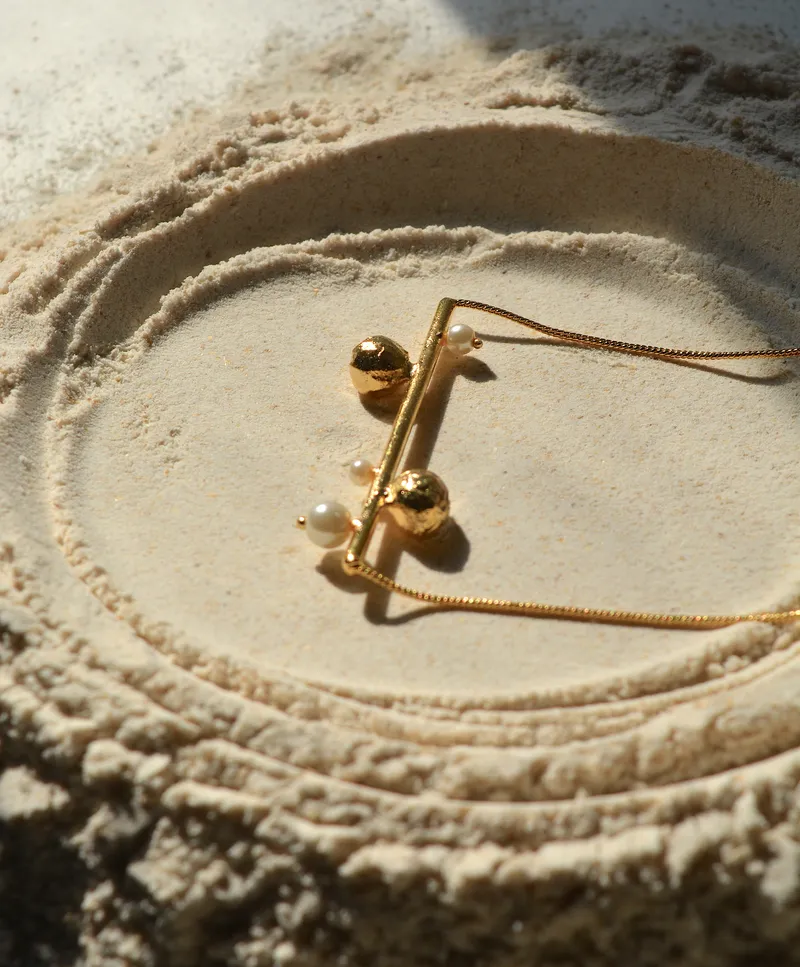Of spices and seeds: Tangerine’s bet on sustainably-made jewellery
Tangerine is a bio jewellery brand made of 100% natural elements like seeds, spices, flowers, and fruits.
For Shristi Ghunawat, designing jewellery seemed like second nature. It all started during her time at the National Institute of Fashion Technology (NIFT) where she focused on designing jewellery.
But when she took a closer look at how jewellery was being made and its impact on the environment, she realised there was a lack of sustainable options. This is eventually what led her to set up , a bio jewellery band with nature at its centre of its work using spices, seeds, and fruits in its pieces.
Green options are in vogue. Recently, fast fashion brands like Zara, Marks & Spencer, H&M, and Uniqlo have launched sustainable ranges to cater to this growing demand. While it is up for debate whether these brands are truly sustainable or not, the market is definitely heating up.
A Bain & Company survey revealed that close to 60% of consumers in India are willing to pay a premium for sustainable products. Several D2C brands in India also have sustainability as a focus such as Go Native, The August Company, No Nasties, Okhai, and Nicobar, among others.
Tangerine falls into this niche, available for environmentally conscious consumers looking to own more green products. Its main target group is women who are aware of sustainability and consider it an important part of their lives.

A pendant by Tangerine
[100 Emerging Women Leaders] How this mother-daughter duo broke stereotypes and bonded with Kathak
Building sustainable businesses
While there may be a significant market, the cost of building a brand using these means is higher. This was especially true for Tangerine.
“It took us 5-6 odd months of trials and errors to standardise the process in order to create jewellery that is sustainable, extremely lightweight, affordable, and modern in its design approach. It also took us time to get the right people on board and incorporate sustainability at various levels such as sourcing, manufacturing, and packaging,” says Shristi.
What she finally arrived at was making bio jewellery. Unlike traditionally cast jewellery available in the market, the use of metal in bio jewellery gets replaced by biodegradable and recycled material.
The crafting of Tangerine pieces is extensive. It involves a six-step process that begins with the sourcing of raw materials.
“This is followed by sorting, sizing, crafting, coating, and cladding the pieces in 24-karat gold. Over 80 percent of the process is done in-house to keep a close tap on the quality and look of the product at each stage,” she explains.
During this process, Tangerine looks to keep as much of the texture and shape of the central elements intact. “Keeping the designs simple but in no way ordinary is our mantra,” she adds.
The team is currently working on getting the right certification and to ensure continued sustainability is achieved, Shristi says the team is reducing the amount of metal used.

Shristi wearing Tangerine earrings and finger rings
Starting a brand during the pandemic
She started the brand in 2021 with her father JP Meena who helps in sourcing elements and is on the financial advisory of the board. The startup is currently bootstrapped.
“We have around 10 individuals working with us to build a strong brand and help us grow. We also work with underprivileged and women workers who help in creating the packaging for the brand,” says Shristi.
Despite the product and processes being in place, starting a brand during the pandemic was not without its challenges. According to Shristi, the team took close to seven months and another two to three months to find the right vendor to help bring the idea to life.
Then came the challenge of building a supply chain.
“Due to lockdowns and restrictions in movement of people, it became very difficult and almost impossible for us to step out and source elements that can be turned into bio jewellery,” says Shristi.
Due to this delay, the first collection sourcing happened in some parts of Rajasthan. “Also, launching a jewellery brand during the time when people were miserable, scared, and unwell didn’t feel right,” she says.
“Therefore, we waited for the first wave to pass—till things began to look under control. The brand was launched in August 2021 when things across the country looked stabilised,” she adds.
Within months of its launch, the second wave of COVID-19 hit. Tangerine found itself being unable to create brand awareness, and its sales were dipping.
“The sales were low as not many people knew about the brand and we could not move out for exhibitions to get the market exposure that a newborn brand requires,” says Shristi.
However, things have changed since then. Since taking Tangerine to major cities, it has seen a positive response.
"The response that we have been receiving since our first exhibition in Delhi has been overwhelming. Also in cities like Mumbai, Bengaluru, Kochi, and Kolkata, it has been way beyond what we had expected,” says Shristi.
Her experience from working with leading brands in the space like Titan Zoya and PC Jewellers also helped her in growing Tangerine.

Tangerine Bracelet
[100 Emerging Women Leaders] Vaishali Sharda’s Mellow is a blend of maternal love and kitchen ingredients
Finding the right price point
For any jewellery brand, finding a good price point is critical. The per unit cost varies according to the product since each element is sourced differently.
For now, the average value of each piece is around Rs 2,800 and can go up to Rs 3,500. Customers shopping with Tangerine end up spending about Rs 5,600 per order on average. The products can be purchased online on the website or other marketplaces.
“As all our jewellery is handcrafted, if the framework of the piece is intricate and time-consuming, only a few multiples of the same can we make in a day,” says Shristi.
The team now aims to make the brand global.
“We are also registered with the iStart platform of the central and state government, which helps budding entrepreneurs on various different levels. We aim to grow the brand through various Indian and international exhibitions and competitions and contribute to making the country proud,” says Shristi.
Edited by Akanksha Sarma







